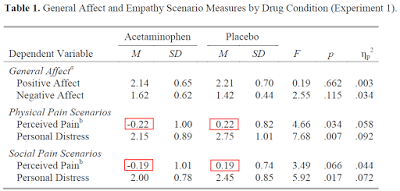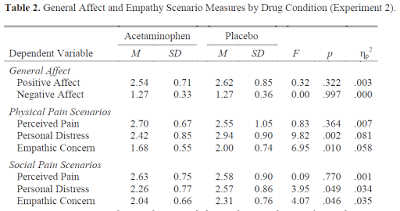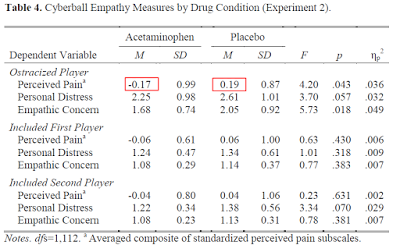Neuroscience

Left: Belgian physician Dr. Wim Distelmans, a cancer specialist, professor in palliative care and the president of the Belgian federal euthanasia commission. Right: Generic acetaminophen.
What (or who) is an “Empathy Killer“? An Angel of Death Kevorkian-type who helps terminally ill patients with ALS or cancer put an end their excruciating pain? This is a very selfless act that shows extreme empathy for the suffering of others.
Or is an “Empathy Killer” a medication that dulls your numerical ratings of empathic concern for fictional characters ever so slightly? If you guessed the latter, you are correct. Here's the actual title of a new paper in SCAN: “From Painkiller to Empathy Killer: Acetaminophen (Paracetamol) Reduces Empathy for Pain.”
Oh the headlines. Truly painful.
Paracetamol doesn't just kill pain - it makes us less CARING
America's Most Common Drug Ingredient Could Be Making You Less Empathetic
Why Would a Headache Medication Make You Less Empathetic?
A popular line of research in Social Cognitive and Affective Neuroscience examines the commonalities between physical and social/psychological pain. IF there is indeed an overlap,1 one might ask some provocative questions about the underlying neural mechanisms. Do drugs that ease physical pain also soothe the pain of social rejection and existential angst?2 Several recent papers have reported that acetaminophen does exactly that (Dewall et al., 2010; Randles et al., 2013; Durso et al., 2015) — although some pundits may beg to differ.3
The latest psychological study on this popular over-the-counter painkiller looks at empathy for another person's pain (Mischkowski et al., 2016). This work is based on the premise that the same neural machinery responsible for feeling our own physical and psychological pain (ACC, AI, mirror neurons — don't ask — but see Zaki et al., 2016) is invoked when observing the pain of others.
The Mystery of the Sliding Scales
[NOTE: Perceived Pain scores standardized in Tables 1, 3, 4 but not Table 2]
Can Tylenol (aka Parecemetol) lessen the pain you feel for others? I'll go out on a limb here and say probably not. Or not much, especially in a real-world sense. Here's why.
First, you have to understand that the experimental ratings of empathy were based on two different scales that varied from 1 (No pain at all) to 5 (Worst possible pain) OR from -4 (Worst possible pain) to +4 (Most possible pleasure). For the latter scale, the authors “reverse-coded participants’ ratings, so higher ratings indicated higher empathy for pain.”
Participants in Experiment 1 were given a placebo drink (n=40) or 1000 mg liquid acetaminophen (n=40). An hour later, they read short scenarios depicting other people in physical pain (e.g., cutting a finger) or social pain (e.g., getting rejected from college). Two major scores were obtained for perceived pain and personal distress. My reading is that these should yield a mean score between 1 and 5 for each measure.
ADDENDUM (May 18 2016): As pointed out by two Anonymous commenters, the Perceived Pain scores were standardized in Table 1. The same measure was not standardized in Table 2.
My guess is that the authors made a mistake in their Tables, or else I misunderstood the scoring scheme. Let's take a look (click on image for a larger view).

For the first Dependent Variable, participants rated their own positive and negative feelings on the PANAS. General Affect ratings didn't differ between drug and placebo.
Next, look at Perceived Pain for Physical Pain Scenarios and Social Pain Scenarios. I won't belabor the p values here. Instead, focus on the red rectangles. [My mistake, Perceived Pain scores were standardized in Table 1. However, this does not affect my next comment.]These values are both close to zero (perhaps not significantly different from zero). But they don't seem to be on the 1 to 5 scale described above. The Personal Distress values ranged from “kind of a little bit” distressed for drug (2.15 and 2.00) to “kind of a little bit more” distressed for placebo (2.75 and 2.45). The participants who received acetaminophen are hardly in the land of the cruel and heartless psychopath. How much would these slight variations in personal distress ratings translate to real world empathy? We simply don't know.
Next, let's figure out the sliding scale issue. In Experiment 2:
So here we have a scale that does include negative numbers, perhaps that scale was used for Perceived Pain in Exp. 1. Except ratings in Exp. 2 seems to use the 1 to 5 scale? It's hard to tell at this point. [Perceived Pain scores were not standardized in Table 2.] At any rate, the differences are small, and not significant for some of the comparisons.

There were other conditions involving noise blasts and watching a person being excluded from a round of cyberball (an old-school ball-tossing video game). Some of the values here were confusing as well. Or maybe I'm just confused... [Yes, I was confused. Perceived Pain scores were standardized in Tables 3 and 4.]
 Noise blasts rated on a scale from 1 (Not unpleasant at all) to 10 (Extremely unpleasant).
Noise blasts rated on a scale from 1 (Not unpleasant at all) to 10 (Extremely unpleasant).
Once again, in Table 4 we see mean values for Perceived Pain that are very close to zero. What does it mean? I will be happy to correct any erroneous interpretations of these Tables.
Now that I have corrected my mistakes, I still think it's hyperbole to say these differences mean that acetaminophen is an empathy killer in real life.
Neuroskeptic points out:

Furthermore, does an Empathic Concern for Ostracized Player score of 1.68 (compared to 2.05) mean you're a less caring person? That acetaminophen has dulled your empathy? An empathy score of 2.05 (out of 5) while on placebo isn't exactly a heart-rending level of concern...

I could be wrong, but I don't think the Tylenol-fueled collapse of civilization is neigh. Next up? Ibuprofen! 4
Footnotes
1 Many have argued that the physical-emotional pain isomorphism is vastly overstated (e.g., Hayes and Northoff, 2012; The Neurocritic, 2012; Iannetti et al., 2013; Woo et al., 2014; Wager et al., 2016).
2 Well sure, you say, people have been self-medicating with opiates and alcohol for centuries. BUT here I mean mild nonprescription medications not known for having psychoactive properties.
3 Yeah, I've written about this a lot.
Tylenol Doesn't Really Blunt Your Emotions
Suffering from the pain of social rejection? Feel better with TYLENOL®
Existential Dread of Absurd Social Psychology Studies
Does Tylenol Exert its Analgesic Effects via the Spinal Cord?
Vicodin for Social Exclusion
4 I've wanted to see that study for years.
References
Dewall CN, Macdonald G, Webster GD, Masten CL, Baumeister RF, Powell C, Combs D, Schurtz DR, Stillman TF, Tice DM, Eisenberger NI. (2010). Acetaminophen reduces social pain: behavioral and neural evidence. Psychological Science 21:931-937.
Durso G, Luttrell A, Way B. (2015). Over-the-Counter Relief From Pains and Pleasures Alike: Acetaminophen Blunts Evaluation Sensitivity to Both Negative and Positive Stimuli. Psychological Science 26:750-758.
Mischkowski, D., Crocker, J., & Way, B. (2016). From Painkiller to Empathy Killer: Acetaminophen (Paracetamol) Reduces Empathy for Pain. Social Cognitive and Affective Neuroscience DOI: 10.1093/scan/nsw057
Randles D, Heine SJ, Santos N. (2013). The common pain of surrealism and death: acetaminophen reduces compensatory affirmation following meaning threats. Psychological Science 24:966-73.
Zaki J, Wager TD, Singer T, Keysers C, Gazzola V. (2016). The Anatomy of Suffering: Understanding the Relationship between Nociceptive and Empathic Pain. Trends Cogn Sci. 20(4):249-59.
- The 'pain' Of Rejection
"From the Archives", first published in the Digest 10.11.03. When rock group REM sing "everybody hurts sometimes" they are, of course, referring to the inevitability of emotional anguish rather than our shared need to occasionally reach for the paracetemol....
- Advil Increases Social Pain (if You're Male)
Headache, Guillaume DELEBARRE (Guigui-Lille) A recent neuroessay in the New York Times asked, Can Tylenol Help Heal a Broken Heart? What’s crazy about the pain of a broken heart is that your body perceives it as physical pain.No it does not. Do you...
- Tylenol Doesn't Really Blunt Your Emotions
A new study has found that the pain reliever TYLENOL® (acetaminophen) not only dampens negative emotions, it blunts positive emotions too. Or does it? Durso and colleagues (2015) reckoned that if acetaminophen can lessen the sting of psychological pain...
- Misery And Empathy
In Misery, a horror tale by Stephen King, Annie [the unbalanced "number one fan" of Paul Sheldon's romance novels] rescues the injured Sheldon from a car accident and seizes the opportunity to nurse her favorite writer back to health, but her...
- Project Tidbits
It ain't really good practice to blog about the research one is doing in order to avoid the risk of it being stolen from right under your nose, so I'm not gonna spill any details of the project I'm involved in now. Except just to say that...
Neuroscience
Acetaminophen Probably Isn't an "Empathy Killer"

Left: Belgian physician Dr. Wim Distelmans, a cancer specialist, professor in palliative care and the president of the Belgian federal euthanasia commission. Right: Generic acetaminophen.
What (or who) is an “Empathy Killer“? An Angel of Death Kevorkian-type who helps terminally ill patients with ALS or cancer put an end their excruciating pain? This is a very selfless act that shows extreme empathy for the suffering of others.
Or is an “Empathy Killer” a medication that dulls your numerical ratings of empathic concern for fictional characters ever so slightly? If you guessed the latter, you are correct. Here's the actual title of a new paper in SCAN: “From Painkiller to Empathy Killer: Acetaminophen (Paracetamol) Reduces Empathy for Pain.”
Oh the headlines. Truly painful.
Paracetamol doesn't just kill pain - it makes us less CARING
America's Most Common Drug Ingredient Could Be Making You Less Empathetic
Why Would a Headache Medication Make You Less Empathetic?
A popular line of research in Social Cognitive and Affective Neuroscience examines the commonalities between physical and social/psychological pain. IF there is indeed an overlap,1 one might ask some provocative questions about the underlying neural mechanisms. Do drugs that ease physical pain also soothe the pain of social rejection and existential angst?2 Several recent papers have reported that acetaminophen does exactly that (Dewall et al., 2010; Randles et al., 2013; Durso et al., 2015) — although some pundits may beg to differ.3
The latest psychological study on this popular over-the-counter painkiller looks at empathy for another person's pain (Mischkowski et al., 2016). This work is based on the premise that the same neural machinery responsible for feeling our own physical and psychological pain (ACC, AI, mirror neurons — don't ask — but see Zaki et al., 2016) is invoked when observing the pain of others.
The Mystery of the Sliding Scales
[NOTE: Perceived Pain scores standardized in Tables 1, 3, 4 but not Table 2]
Can Tylenol (aka Parecemetol) lessen the pain you feel for others? I'll go out on a limb here and say probably not. Or not much, especially in a real-world sense. Here's why.
First, you have to understand that the experimental ratings of empathy were based on two different scales that varied from 1 (No pain at all) to 5 (Worst possible pain) OR from -4 (Worst possible pain) to +4 (Most possible pleasure). For the latter scale, the authors “reverse-coded participants’ ratings, so higher ratings indicated higher empathy for pain.”
Participants in Experiment 1 were given a placebo drink (n=40) or 1000 mg liquid acetaminophen (n=40). An hour later, they read short scenarios depicting other people in physical pain (e.g., cutting a finger) or social pain (e.g., getting rejected from college). Two major scores were obtained for perceived pain and personal distress. My reading is that these should yield a mean score between 1 and 5 for each measure.
ADDENDUM (May 18 2016): As pointed out by two Anonymous commenters, the Perceived Pain scores were standardized in Table 1. The same measure was not standardized in Table 2.
PERCEIVED PAIN — For each scenario, we measured perceived pain with two measures. First, participants rated the pain of each protagonist using a scale from 1 (No pain at all) to 5 (Worst possible pain). Second, participants rated on three items how much each protagonist felt hurt, wounded, and pained on scales ranging from 1 (Not at all) to 5 (Extremely). We averaged items to create perceived hurt feeling measures across physical and social pain scenarios... Within each scenario type, both perceived pain ratings correlated highly... Therefore, we standardized and averaged these measures into indices of perceived physical and social pain.
PERSONAL DISTRESS — Participants also rated their personal distress when reading each scenario. On a scale from 1 (Not at all) to 5 (Extremely), participants rated the extent to which they felt uncomfortable, pained, bothered, unpleasant, distress, as well as wanted to cringe while imagining the feelings of each scenario protagonist. We averaged items to create separate personal distress measures for physical and social pain scenarios...
My guess is that the authors made a mistake in their Tables, or else I misunderstood the scoring scheme. Let's take a look (click on image for a larger view).

For the first Dependent Variable, participants rated their own positive and negative feelings on the PANAS. General Affect ratings didn't differ between drug and placebo.
Next, look at Perceived Pain for Physical Pain Scenarios and Social Pain Scenarios. I won't belabor the p values here. Instead, focus on the red rectangles. [My mistake, Perceived Pain scores were standardized in Table 1. However, this does not affect my next comment.]
Next, let's figure out the sliding scale issue. In Experiment 2:
Participants read the same eight physical and social pain empathy scenarios as in Experiment 1. After reading each scenario, participants rated perceived pain of the protagonist, using a scale from -4 (Worst possible pain) to +4 (Most possible pleasure). We reverse-coded participants’ ratings, so higher ratings indicated higher empathy for pain.
So here we have a scale that does include negative numbers, perhaps that scale was used for Perceived Pain in Exp. 1. Except ratings in Exp. 2 seems to use the 1 to 5 scale? It's hard to tell at this point. [Perceived Pain scores were not standardized in Table 2.] At any rate, the differences are small, and not significant for some of the comparisons.

There were other conditions involving noise blasts and watching a person being excluded from a round of cyberball (an old-school ball-tossing video game). Some of the values here were confusing as well. Or maybe I'm just confused... [Yes, I was confused. Perceived Pain scores were standardized in Tables 3 and 4.]

Once again, in Table 4 we see mean values for Perceived Pain that are very close to zero. What does it mean? I will be happy to correct any erroneous interpretations of these Tables.
Now that I have corrected my mistakes, I still think it's hyperbole to say these differences mean that acetaminophen is an empathy killer in real life.
Neuroskeptic points out:
Something odd about some of the datapoints... In Table 1, the mean for "perceived pain" for placebo is equal to the mean for acetaminophen * -1 (e.g. 0.22 vs -0.22, 0.19 vs. -0.19). The same is true in Table 4, two different values (e.g. 0.06 vs. -0.06, 0.04 vs -0.04).

Furthermore, does an Empathic Concern for Ostracized Player score of 1.68 (compared to 2.05) mean you're a less caring person? That acetaminophen has dulled your empathy? An empathy score of 2.05 (out of 5) while on placebo isn't exactly a heart-rending level of concern...

Cyberball 4.0
I could be wrong, but I don't think the Tylenol-fueled collapse of civilization is neigh. Next up? Ibuprofen! 4
Footnotes
1 Many have argued that the physical-emotional pain isomorphism is vastly overstated (e.g., Hayes and Northoff, 2012; The Neurocritic, 2012; Iannetti et al., 2013; Woo et al., 2014; Wager et al., 2016).
2 Well sure, you say, people have been self-medicating with opiates and alcohol for centuries. BUT here I mean mild nonprescription medications not known for having psychoactive properties.
3 Yeah, I've written about this a lot.
Tylenol Doesn't Really Blunt Your Emotions
Suffering from the pain of social rejection? Feel better with TYLENOL®
Existential Dread of Absurd Social Psychology Studies
Does Tylenol Exert its Analgesic Effects via the Spinal Cord?
Vicodin for Social Exclusion
4 I've wanted to see that study for years.
References
Dewall CN, Macdonald G, Webster GD, Masten CL, Baumeister RF, Powell C, Combs D, Schurtz DR, Stillman TF, Tice DM, Eisenberger NI. (2010). Acetaminophen reduces social pain: behavioral and neural evidence. Psychological Science 21:931-937.
Durso G, Luttrell A, Way B. (2015). Over-the-Counter Relief From Pains and Pleasures Alike: Acetaminophen Blunts Evaluation Sensitivity to Both Negative and Positive Stimuli. Psychological Science 26:750-758.
Mischkowski, D., Crocker, J., & Way, B. (2016). From Painkiller to Empathy Killer: Acetaminophen (Paracetamol) Reduces Empathy for Pain. Social Cognitive and Affective Neuroscience DOI: 10.1093/scan/nsw057
Randles D, Heine SJ, Santos N. (2013). The common pain of surrealism and death: acetaminophen reduces compensatory affirmation following meaning threats. Psychological Science 24:966-73.
Zaki J, Wager TD, Singer T, Keysers C, Gazzola V. (2016). The Anatomy of Suffering: Understanding the Relationship between Nociceptive and Empathic Pain. Trends Cogn Sci. 20(4):249-59.
- The 'pain' Of Rejection
"From the Archives", first published in the Digest 10.11.03. When rock group REM sing "everybody hurts sometimes" they are, of course, referring to the inevitability of emotional anguish rather than our shared need to occasionally reach for the paracetemol....
- Advil Increases Social Pain (if You're Male)
Headache, Guillaume DELEBARRE (Guigui-Lille) A recent neuroessay in the New York Times asked, Can Tylenol Help Heal a Broken Heart? What’s crazy about the pain of a broken heart is that your body perceives it as physical pain.No it does not. Do you...
- Tylenol Doesn't Really Blunt Your Emotions
A new study has found that the pain reliever TYLENOL® (acetaminophen) not only dampens negative emotions, it blunts positive emotions too. Or does it? Durso and colleagues (2015) reckoned that if acetaminophen can lessen the sting of psychological pain...
- Misery And Empathy
In Misery, a horror tale by Stephen King, Annie [the unbalanced "number one fan" of Paul Sheldon's romance novels] rescues the injured Sheldon from a car accident and seizes the opportunity to nurse her favorite writer back to health, but her...
- Project Tidbits
It ain't really good practice to blog about the research one is doing in order to avoid the risk of it being stolen from right under your nose, so I'm not gonna spill any details of the project I'm involved in now. Except just to say that...
